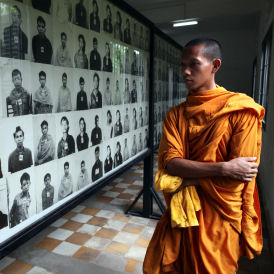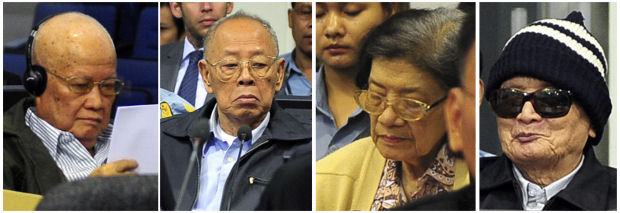Khmer Rouge commanders go on trial in Cambodia
The four most senior surviving members of Cambodia’s murderous Khmer Rouge regime have gone on trial for war crimes.

The defendants were all among the inner circle of the late Pol Pot, the architect of the Khmer Rouge’s Maoist “Killing Fields” revolution which saw nearly two million Cambodians wiped out from 1975 to 1979.
Almost a quarter of Cambodia‘s population died under the regime through torture, execution and starvation.
The four, all now elderly and infirm, are charged with committing crimes against humanity and genocide, as well as other crimes including murder, enslavement, religious and political persecution, inhumane treatment and unlawful imprisonment.
I lost three children, my father and husband. I’m always hopeful there will be justice. Som Huen, Cambodian villager
Former President Khieu Samphan, ex-Foreign Minister Ieng Sary, former Social Affairs Minister Ieng Thirith and “Brother Number Two” Nuon Chea (pictured below, L-R), are all expected to enter not guilty pleas. They showed no emotion as the opening statements were read out at the UN-backed tribunal in Cambodia, which is being screened on national television.
Apart from Mr Samphan, none of the defendants have shown willing to co-operate with the trial. The closest any have come to an admission of guilt came in the documentary Enemies of the People, when Nuon Chea expressed remorse for his party’s reign of terror. The filmmakers have refused to hand over their material to the tribunal.

Sense of justice
Many Cambodians as well as human rights activists hope the trial will bring a sense of justice for the horror of the past. The court has so far sentenced one other key player in the Khmer Rouge regime – Kaing Guek Eay, alias Duch, over the deaths of more than 14,000 people at the notorious S-21 prison. He was sentenced to 35 years in prison and has appealed against the ruling.
Ou Virak, President of the Cambodian Centre for Human Rights, said the opening of this trial was a “cathartic moment”.
He said the crimes “remain ingrained in Cambodia’s collective psyche. I hope that this trial…provides all victims with some sense of justice, however delayed that justice may be.”
The trial is also seen as a test of whether the Extraordinary Chambers in the Courts of Cambodia, set up in 2005, can deliver justice. It has been hampered by bureaucracy and there are now concerns that some of the elderly defendants could die before the court reaches a verdict.
Som Hoeun, a 66-year old villager from southern Kompong Speu province, said she remained hopeful that there would be a resolution.
“I lost three children, my father and husband. No matter what how long it has been, I’m always hopeful there will be justice,” she said.